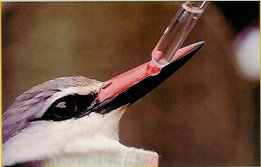|
WILD BIRD RESCUE
Any adult wild bird which allows itself to be picked up, or to be easily caught, is clearly compromised (whether by injury or illness) and is in need of help!
Catch the bird as gently as possible, taking care not to traumatise existing injuries. Handle a frightened bird gently enclosing it in a towel. See that it can breathe. Be carefull that the birds with long sharp beaks do not peck you in the eye!
Most birds can be either saved or lost by immediate treatment given (or withheld) when they are rescued. Donít delay! Stabilising, life saving, fist aid treatments, that are universally applicable are:
∑ PEACE AND QUIET: Place the bird in a ravel-free towel in a ventilated (small round air holes) cardboard box, not a wire cage. Keep voices down. Keep other pets and onlookers away.
∑ WARMTH: If the bird is cool or cold to the touch, itís dying and URGENTLY needs heat. Provide a direct heat source. If necessary, use your body. Simply put the bird inside your clothing. Good sources of warmth are: a heated Ďbeanbagí, a well secured two-litre plastic bottle of hot water, a light bulb or a warm water bottle. Use your common sense, and watch constantly for over-and-underheating.
∑ REHYDRATION: Any sick or injured bird is likely to be dehydrated. Mix Emergency Oral Electrolytes made up of 900ml warm water with three teaspoons of sugar and one teaspoon table salt. Administer lukewarm to all stressed or dehydrated birds. Gently restrain the bird in a towel. Supply the electrolytes drop by drop to the side of the closed and tilted beak with an eyedropper, a syringe (needle removed) or even a clean fingertip. The beak is not waterproof and the liquid will dribble into the birdís throat without choking. Give at least 20 percent of the birdís own bodyweight in liquids over a period of 24 hours.

∑ GET HELP: Get the bird to a proper rehabilitation centre as soon as possible. Call your local centre.
To treat the bird yourself, you need medical advice.
Animal Talk February 1999
< Back
|













